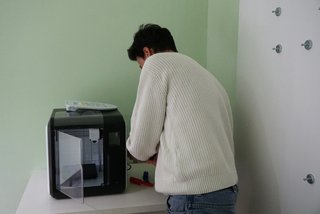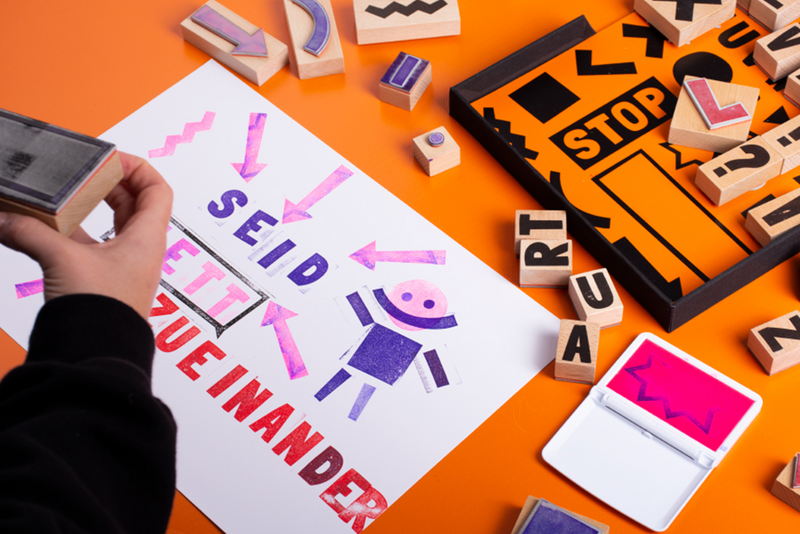
Multi-talented game designer
Markus Utomo is a game designer with an eye for AI and the production process
By Peter Budig
Nuremberg-based game designer Markus Utomo rolled out around two million self-made games – an unusually high number that is untypical for the industry. Still, he claims to “not be your typical game designer”. Markus studied industrial design with a concentration on the Design of Playing and Learning yet did not approach publishing houses with his products. His game ideas target a different customer base. They are intended to ensure, for example, that children do not get bored on long-haul flights. In this case, Lufthansa is his client which gifts these games as welcome give-aways.
Cuddly toys inside a ball
Markus Utomo’s career start was rather dramatic: While working on his ambitious dissertation in 2008 towards a diploma in Industrial Design with a concentration on the Design of Playing and Learning in Halle an der Saale in Germany, he came across a tender for a design contest created by Bayern Design and the Steiff plush toy company: “My fellow students thought I was crazy because they, just like I, were very focused on the final stages of their dissertation. The project he submitted for the contest: a soft toy inside a ball, designed as something of a ball game. When thrown, the data generated by the movement is digitally recorded and published as a ranking list. That turned out to be a fun game for kids and, in the evening, the toys could be removed from the ball to be cuddled with. He won the contest with that idea.
Diploma thesis as a kickstart to his professional career
Markus Utomo’s diploma thesis was about a board game with a digital connection which already tapped AI: we_want_robots, a fun game with robots. His final work was thus a true reflection of his studies which also included stints abroad in Oslo and Tokyo where the focus was on interaction design, which is a combination of software and production development. The prize made his career start easier. His diploma thesis was an admission ticket to a full-term position at the Nuremburg-based toy company, SIMM Spielwaren GmbH, his first professional stop.
After eight years of employment, it was time to go self-employed
“I had a great time. As a designer, I enjoyed a lot of leeway at Simm. That proved to be highly beneficial for both sides. But after eight years, I achieved everything I had imagined and thought increasingly about going independent”, he recalls. “I was very well connected, had already received several enquiries and was barely worried that things might not work out.” And once again, a contest helped him on his way: “Once a year, the accolade as Kultur- und Kreativpilot Deutschland is awarded to founders, founding teams and businesses who co-create the future of the economy and of our society through innovative business ideas”, so the description of the tender by Germany's Ministry for Economic Affairs.
Utomo, creative pilot
Of the 600 business applicants, Markus Utomo made it with his Fluxmodifikator. In 2016, he was one of 30 award winners allowed to call themselves a Kultur- und Kreativpilot Deutschland. For this application, he already used a 3D printer. The Fluxmodifikator can modify any given toy design in an easy and intuitive way in a few minutes only. For Markus, this was a toy car whose properties and design were then in the hands of the player. “A seal of approval like that from the German government including the award ceremony in Berlin is, of course, an outstanding start into self-employment”, he recalls. To this day, he benefits from being coached (coaching rather than prize money being the reward) and having access to a network of active business creatives which he can tap as a result of winning.
“The idea of a game as a cultural asset has replaced the opinion of being kid’s stuff”
As someone who likes playing also in his private life, Markus was always willing to immerse himself in the fascination of a complex board game. And also as a console gamer he has spent many hours absorbed by his passion. These days, it is his family life with two kids aged four and ten who determine his free time. Yet his view of the game industry has been honed by years of focusing on it: “Today, playing has a totally different value than before. In the past, it was for children only. Today, we have come to learn that playing per se is something meaningful, that as a person you win and learn by playing, all while having fun. The idea of game as a cultural asset has long replaced the disparaging view of it being kid’s stuff only.” Which, however, does not prevent him from playing (passionately) with his kids and contributing as a crafty DIY fan in developing new game formats and making them a reality.
Markus’ specialty: out of the ordinary game ideas

In principle, that is also the essence of his independence. Right from the start, his focus was on the end customer. His business with his freelancing strategy, however, was based on “selling ideas”. Markus even invented three board games for children which he pitched to publishing houses on his own initiative, but the financial reward was modest. The added financial value of Utomo Game Design was based on unusual game ideas which followed his expertise in 3D printing honed over years, in web design and increasingly in supporting the use of Artificial Intelligence – an unusually intense combination of creativity and technology thought-through to the very last detail: “I always keep an eye on mass production when thinking up a creative process.”
Game ideas flying high
This then led to the amazing assignment of developing games for Lufthansa passengers. They need new ideas and games every year, which makes this a solid base for business. All games are geared precisely to what is needed, with each of them being totally unique and not available to buy anywhere: “The packaging already serves as the playing field which is just large enough to fit onto the fold-out table in front of the passenger. Markus has also designed customised games for little guests staying at hotels.
The Mona Lisa of the toy museum

Another client for Markus’ creative output is Nuremburg’s toy museum. Initially, he contributed his skills in setting up the exhibition. In 2021, the year of the museum’s 50th anniversary, they thought up something special: One of the museum’s valuable exhibits is the so-called Kruseler doll which is something of a “Mona Lisa to the toy museum”, according a recent press release. This is a doll made of clay from the 14th century. Sporting an every-day dress, she is wearing a Kruseler bonnet – at the time a real fashion statement. The doll was found during construction work in Nuremburg in 1856. On the occasion of the anniversary, the designer took a three-dimensional scan of the doll and recreated a copy made from sustainable veneer fabric using a 3D printer. Flaws – such as chipped clay in the historical original – were restored. The exhibit is on sale at the museum shop as a special highlight for € 29.90 and is a popular souvenir.
In-demand expert for opportunities and risks from AI
Today, Markus is more and more in demand as a speaker and as an expert on AI and holistic design processes. The complex knowledge that has grown through self-learning in combination with his assignments, his understanding of the entire production chain for games and the professional view on building brands make him a unique design developer. Add to this that he is very well connected in the scene. “Of course I am lucky about my homebase, with Nuremberg being the city of toys. On top of that, the Spielwarenmesse toy fair drops the entire industry once a year directly on to my doorstep. I can make any number of appointments with clients every day in addition to scanning new products.” In terms of the upcoming toy fair, he will make an appearance at the Toy Business Forum and speak about AI in the toy industry, while pointing to one of Nuremburg’s achievements: Empamos – AI developed at Ohm (Nuremberg Institute of Technology). Professor Thomas Voit and his team trained AI with thousands of rules to be able to then measure the quality of a game. Markus has become a Empamos AI certified designer for gameful motivation.
Success as a freelancer
The high school graduate who used to dream of becoming a paediatrician has become a successful freelancer with his own design studio. While doing his community service in kindergarten, he already began to design games for ‘his kids’ who kept asking for news things over and again. This helped him pave the way in creating ever new ideas for a life of learning.
Markus Utomo live at the Spielwarenmesse 2024
Find out first-hand how the interaction between Artificial Intelligence and toy design is evolving: “From idea to product: How AI is changing the design of games and toys”. The talk will take place on Saturday, 3 February 2024 between 3:25 and 3:55 pm at the Toy Business Forum in Hall 3A at the 2024 Toy Fair.
Markus Utomo will be available to answer questions following the talk.
The complete Toy Business Forum knowledge on offer is available in the Programme.
About the author
Peter Budig studied Protestant theology, history and political science. He worked as a freelance journalist, headed up the editorial department of a large advertising paper in Nuremberg for ten years and was the editor of Nuremberg’s Abendzeitung newspaper. He has been freelancing again since 2014 as a journalist, book author and copywriter. Storytelling is absolutely his favourite form of writing.



![[Translate to Englisch:] [Translate to Englisch:]](/fileadmin/_processed_/1/1/csm_20230112_Teaser_ffd16edeed.jpg)
